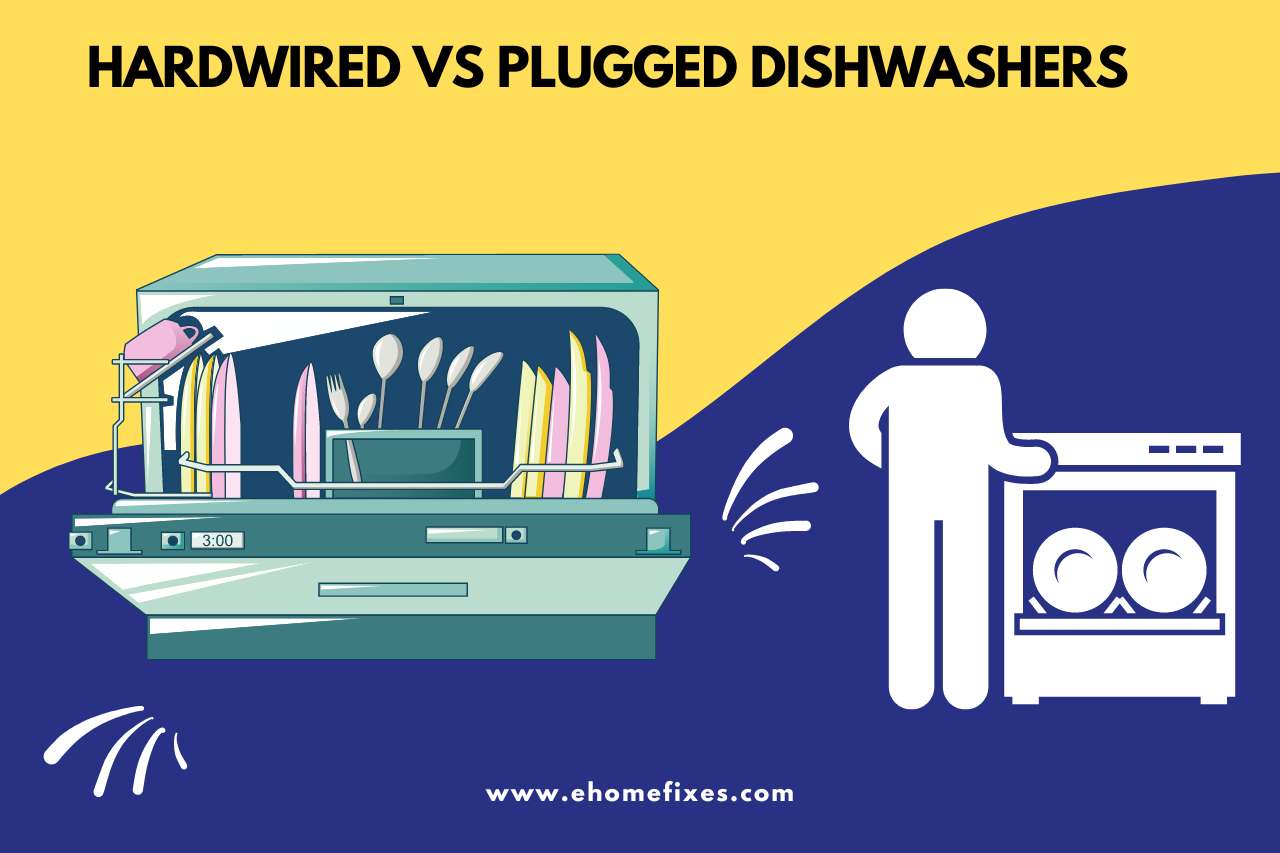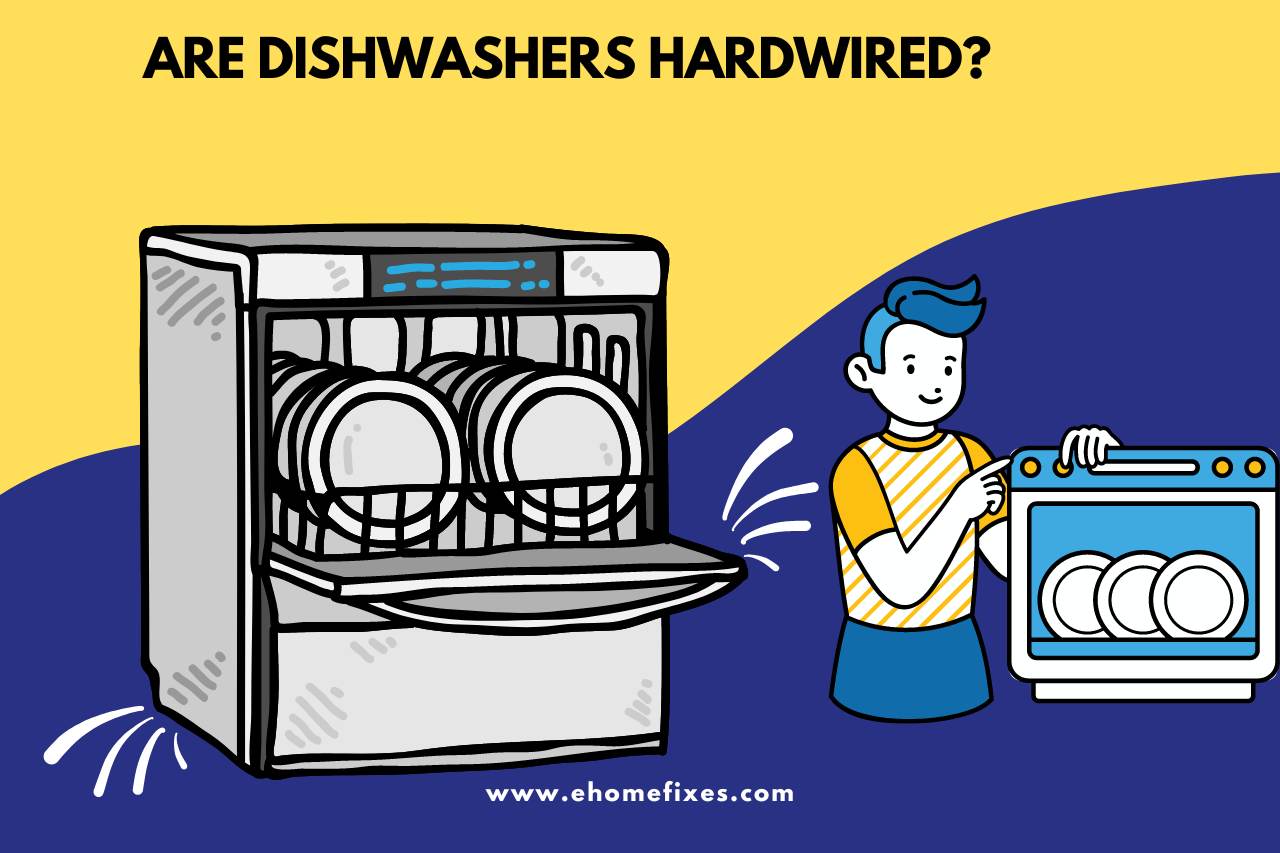Are Dishwashers Hardwired? Understanding Dishwasher Wiring!
One of the important considerations when installing a dishwasher in your kitchen is whether it will be hardwired into your home’s electrical system or plugged into an outlet. The brand and model of the dishwasher are essential factors in this choice. Dishwasher hardwiring, which necessitates a direct connection to your home’s electrical circuit, is a common technique in the industry. Some dishwasher models provide a more adaptable solution by including an electrical cord and a plug for a regular outlet. This article discusses all about this topic.
What does “hardwired” Mean in Household Appliances?
In the context of household appliances, the term ‘hardwired’ refers to a method of electrical connection where the appliance is physically and permanently connected to the household wiring system.
Essentially, hardwired appliances lack a standard plug that can be inserted into an electrical outlet. Instead, they are integrated directly into the electrical circuits of a building.
This approach is commonly seen in appliances like ovens, dishwashers, and range hoods, where a dedicated electrical cable or conduit is connected directly to the appliance. These electrical leads are typically supplied with the appliance and are used to establish a secure and permanent electrical connection.
There is no need for a plug-and-socket connection because hardwiring guarantees a stable and uninterrupted electrical supply to the appliance.
In kitchens and other areas, appliances are often created to blend in with the architecture of the building, giving them a clean and integrated appearance.
Are Modern Dishwashers Hardwired or Plugged In?
Modern dishwashers can be either hardwired or plugged in, and the choice often depends on the type of dishwasher and local electrical codes. Considering the potential effectiveness of each of these methods, there are certain efficiency and safety concerns.
According to the National Electrical Code (NEC), hardwiring dishwashers is the preferred and safer method. It is because dishwashers consume significant electrical energy, and improper electrical connections can lead to electrical accidents at home.
Electrical problems are far less probable because of hardwiring, which guarantees a more dependable and secure electrical supply.
Hardwired dishwashers are also less susceptible to fluctuations in power, ensuring efficient and uninterrupted operation.
Hardwiring eliminates power cords that children might tamper with, enhancing safety. It also contributes to a neater kitchen with no exposed power cords.
Some portable or countertop dishwashers may come with a plug and cord for convenience, which can be plugged into a dedicated electrical outlet. This flexibility allows for easier relocation and installation.
In conclusion, while plug-in and hardwired connections for dishwashers are functional, hardwiring is frequently advised for safety, effectiveness, and aesthetics, particularly for built-in machines.
Portable dishwashers may come with plugs for added convenience and mobility. When choosing between hardwiring and plugging in a dishwasher, local electrical codes and regulations should be followed.

Hardwired vs Plugged Dishwashers
The choice between a plugged-in and a hardwired dishwasher primarily comes down to individual preferences and kitchen requirements.
Plugged-in dishwashers are relatively straightforward to install, making them a cost-effective option.
They don’t require professional installation because they come with a power cord and can be connected to a regular electrical socket. In the future, if you decide to move your dishwasher or if you want to do some DIY, this flexibility may be extremely useful.
Hardwired dishwashers offer certain advantages. They provide a cleaner and more integrated look in the kitchen, as there are no visible cords. Hardwiring improves security by lowering the possibility of electrical incidents, particularly for powerful models.
Hardwiring assures a steady and dedicated power source, making it appropriate for larger, more powerful dishwashers.
Your final option depends on your aesthetic preferences, the arrangement of your kitchen, and if you prioritize easy installation over a seamless, integrated appearance.
How Do you Identify If your Dishwasher is Hardwired?
Identifying whether your dishwasher is hardwired is relatively straightforward. Examine the power cord that connects the dishwasher to the electrical supply. In the case of a hardwired dishwasher, you won’t find a plug at the end of the cord.
Instead, the cord will be directly connected to the machine itself. Typically, this connection is located at the bottom or back of the dishwasher unit.
Observing a power cord with a plug at the end indicates that your dishwasher is designed to be plugged into a standard electrical outlet.
In this scenario, the dishwasher is not hardwired, providing flexibility for installation and relocation as it can be easily disconnected from the outlet.
How to Hardwire a Dishwasher?
- Safety First – Turn off the power to the dishwasher by locating the dedicated breaker and switching it to the OFF position. It ensures your safety while working with electrical connections.
- Prepare Existing Wires – If replacing an old dishwasher, use the existing wire. Make sure it’s in good condition and long enough to reach the front of the new dishwasher.
- Secure the Cable – Ensure it is properly secured along the back or bottom of the dishwasher to prevent it from getting tangled or caught during installation.
- Wiring – Open the dishwasher’s junction box, usually located at the back of the unit. Splice the wires from the dishwasher to the corresponding leads, ensuring a secure and proper connection. Afterwards, replace the junction box cover.
- Installation – Slide the dishwasher into its designated space in your kitchen cabinet and make the necessary plumbing connections.
Advantages of a Hardwired Dishwasher
- Clean and Neat Appearance – Hardwiring results in a cleaner and neater look in your kitchen, as there are no visible wires, outlets, or receptacles around the dishwasher.
- No Need for an Electrical Outlet – Hardwiring simplifies the setup, especially in new homes, as you don’t need a dedicated electrical outlet.
- Hidden Wiring – The wiring in hardwired dishwashers is concealed, contributing to a more organized and tidy appearance.
- Risk Elimination – With hardwiring, there’s no risk of water discharge during operation or maintenance, enhancing safety.
- Efficient Performance – Hardwired dishwashers have consistent access to the required electrical current, ensuring efficient and reliable performance.
Watch this one,
Video Credits – Homeguideinfo
You May Also Like







